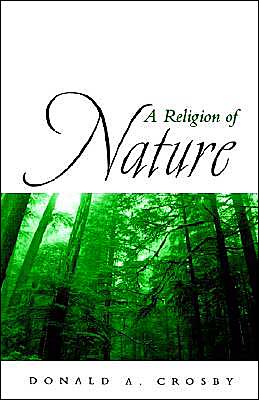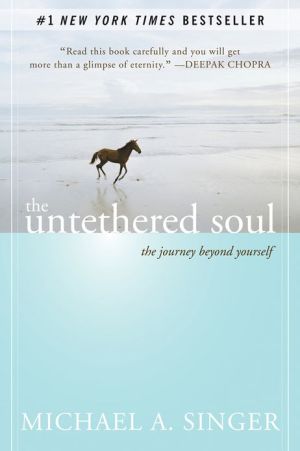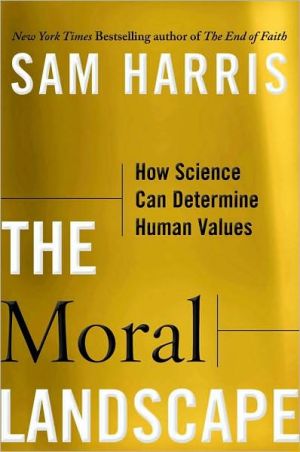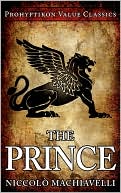A Religion of Nature
An eloquent case for regarding nature itself as religion-as the metaphysical ultimate deserving religious commitment. BACKCOVER: The beauty, sublimity, and wonder of nature have been justly celebrated in all of the religious traditions of the world, but usually these traditions have focused on beings or powers presumed to lie behind nature, providing nature's ultimate explanation and meaning. In a radical departure, Donald A. Crosby makes an eloquent case for regarding nature itself as...
Search in google:
An eloquent case for regarding nature itself as religion-as the metaphysical ultimate deserving religious commitment. BACKCOVER: The beauty, sublimity, and wonder of nature have been justly celebrated in all of the religious traditions of the world, but usually these traditions have focused on beings or powers presumed to lie behind nature, providing nature's ultimate explanation and meaning. In a radical departure, Donald A. Crosby makes an eloquent case for regarding nature itself as religion, conceived without God, gods, or animating spirits of any kind, and argues that nature is metaphysically ultimate. He explores the concept of nature, the place of humans in nature, the responsibilities of humans to one another and to their natural environments, and offers a religious vision that grants to nature the kind of reverence, awe, love, and devotion formerly reserved for God. Crosby also shares his personal journey from theistic faith to a religion of nature.Author Biography: Donald A. Crosby is Professor of Philosophy at Colorado State University. He has published several books, including The Specter of the Absurd: Sources and Criticisms of Modern Nihilism, also published by SUNY Press, and, most recently, Religion in a Pluralistic Age (coedited with Charley D. Hardwick). Library Journal Two dissimilar arguments on nature and religion are here offered by McGrath (theology, Oxford) and Crosby (philosophy, Colorado State Univ.). McGrath claims that humanity's vanishing sense of marvel or enchantment in nature results from scientific rationalism. He maintains that religion, specifically evangelical Christianity, urges humanity to cherish its divine origins and see in the beauty of nature not God but signposts that point to a transcendence wherein we find God. Alongside this, however, McGrath sustains a running quarrel with Lynn White's 1967 article "On the Historical Roots of Our Ecological Crisis" and Darwinian Richard Dawkins, taking a chapter to prove Dawkins's "strident antireligious advocacy." Not a primer on how to become reenchanted with nature, McGrath's book stands in danger of merely offering a cadre of evangelical proofs against a small, specific scientific community that fails to see nature as God's art. On the other hand, Crosby (Specter of the Absurd: Sources and Criticisms of Modern Nihilism) takes an admittedly atheistic yet blithely optimistic stance. Relying upon philosophers like Alfred North Whitehead and William James, he espouses a literal religion of nature: "we need not go any further than nature to probe the depths of our existence and powers that sustain our being." Seeing nature as metaphysically ultimate, he offers a systematic religious naturalism devoid of God, prayer, or spirituality beyond that found in the beauty and inherent goodness of the earth. Since nature is metaphysically ultimate, Crosby must admit that both good and evil consequently reside there. Thus, humanity's task becomes one of aligning with the good and struggling against evil and how that is discerned, defined, or done is never clearly delineated. Both books are academic in tone and plainly intended for a scholarly audience. Recommended only where religious interest warrants. Sandra Collins, Duquesne Univ. Lib., Pittsburgh Copyright 2002 Cahners Business Information.
PrefacePt. 1Introduction1From God to Nature: A Personal Odyssey3Pt. 2The Nature of Nature2Concept of Nature173Science and Nature434Values in Nature575Humans and Nature89Pt. 3A Religion of Nature6The Nature of Religion and a Religion of Nature1177Objections to a Religion of Nature1318The Religious Ultimacy of Nature159Notes171Selected Bibliography187Index of Authors and Titles193Index of Subjects197
\ Library JournalTwo dissimilar arguments on nature and religion are here offered by McGrath (theology, Oxford) and Crosby (philosophy, Colorado State Univ.). McGrath claims that humanity's vanishing sense of marvel or enchantment in nature results from scientific rationalism. He maintains that religion, specifically evangelical Christianity, urges humanity to cherish its divine origins and see in the beauty of nature not God but signposts that point to a transcendence wherein we find God. Alongside this, however, McGrath sustains a running quarrel with Lynn White's 1967 article "On the Historical Roots of Our Ecological Crisis" and Darwinian Richard Dawkins, taking a chapter to prove Dawkins's "strident antireligious advocacy." Not a primer on how to become reenchanted with nature, McGrath's book stands in danger of merely offering a cadre of evangelical proofs against a small, specific scientific community that fails to see nature as God's art. On the other hand, Crosby (Specter of the Absurd: Sources and Criticisms of Modern Nihilism) takes an admittedly atheistic yet blithely optimistic stance. Relying upon philosophers like Alfred North Whitehead and William James, he espouses a literal religion of nature: "we need not go any further than nature to probe the depths of our existence and powers that sustain our being." Seeing nature as metaphysically ultimate, he offers a systematic religious naturalism devoid of God, prayer, or spirituality beyond that found in the beauty and inherent goodness of the earth. Since nature is metaphysically ultimate, Crosby must admit that both good and evil consequently reside there. Thus, humanity's task becomes one of aligning with the good and struggling against evil and how that is discerned, defined, or done is never clearly delineated. Both books are academic in tone and plainly intended for a scholarly audience. Recommended only where religious interest warrants. Sandra Collins, Duquesne Univ. Lib., Pittsburgh Copyright 2002 Cahners Business Information.\ \








